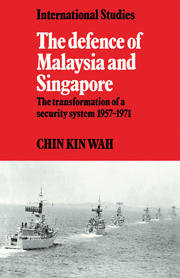Book contents
- Frontmatter
- Contents
- Preface
- Acknowledgements
- List of abbreviations
- Note on currency units
- 1 Introduction
- 2 Pre-treaty defence relations
- 3 Decolonisation and the institution of the defence agreement
- 4 The extension of AMDA
- 5 The external testing of AMDA
- 6 Towards a closing of ranks
- 7 The fractured axis
- 8 Britain weighs anchor
- 9 From AMDA to the five-power defence system
- 10 Conclusions
- Postscript on five-power arrangements
- Notes
- Bibliography
- Index
3 - Decolonisation and the institution of the defence agreement
Published online by Cambridge University Press: 07 October 2011
- Frontmatter
- Contents
- Preface
- Acknowledgements
- List of abbreviations
- Note on currency units
- 1 Introduction
- 2 Pre-treaty defence relations
- 3 Decolonisation and the institution of the defence agreement
- 4 The extension of AMDA
- 5 The external testing of AMDA
- 6 Towards a closing of ranks
- 7 The fractured axis
- 8 Britain weighs anchor
- 9 From AMDA to the five-power defence system
- 10 Conclusions
- Postscript on five-power arrangements
- Notes
- Bibliography
- Index
Summary
The Malayan elections of July 1955, in which the Tunku's Alliance Party won 51 out of 52 elective seats, marked an acceleration in the process towards full independence. Constitutional progress had, after the 1955 elections, reached the stage where a diarchy of elected politicians and British officials held important ministries with the Tunku as Chief Minister, although Britain still controlled important areas like defence, finance and the civil service. Following the visit of the Colonial Secretary, Mr Alan Lennox-Boyd (later Lord Boyd), to Kuala Lumpur at the end of August, constitutional talks on the question of self-government were scheduled for early 1956.
Even while the CSR was being made operational, the imminence of Malayan independence reopened the issue of foreign involvement in Malayan defence, this time not only to public debate but also to quiet negotiation. By the beginning of 1956, when the Malayan delegation arrived in London for the scheduled conference on independence, an admixture of circumstances influenced the Tunku's attitude towards the problem of an eventual transfer of responsibility for defence, which, together with the issues of finance and the public services, constituted the core of discussion.
The Tunku's delegation left for London shortly after the abortive Baling talks with the MCP leaders (held on 28 and 29 December 1955) following ‘peace soundings’ by the MCP in response to the declared amnesty. These talks failed when it became clear that the amnesty terms, over which the Tunku refused to compromise, were unacceptable to the communists.
- Type
- Chapter
- Information
- The Defence of Malaysia and SingaporeThe Transformation of a Security System 1957–1971, pp. 23 - 36Publisher: Cambridge University PressPrint publication year: 1982



